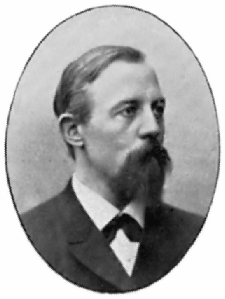
|
Anders Lindstedt (27 June 1854-16 May 1939) |
{ H.C. JIA 70 1939 269, originaal}
Anders Lindstedt was born in a small village in the province of Dalecarlia, Sweden. He studied in the University of Lund, where at the age of 23 he obtained the degree of Ph.D. and was appointed lecturer in astronomy. A few years afterwards he accepted a position in the University of Dorpat (then belonging to Russia), where he lived for about seven years, devoting himself mainly to research work in theoretical astronomy. During this period, he published valuable papers on celestial mechanics, which have served as bases for several subsequent investigations, e.g. by Henri Poincaré. He was for many years a Corresponding Member of the Institute of Actuaries, London.

Anders Lindstedt 1854-1939
In 1886 Lindstedt returned to Sweden as professor of mathematics and theoretical mechanics in the Royal Polytechnical High School in Stockholm. In this position he remained until 1909. It was during these years that his connexion with actuarial science began. He made important investigations for pension funds and worked as a member of several governmental committees charged with various tasks connected with insurance law and social insurance. For some time he was also appointed as the King's Inspector of private insurance companies.
In 1909 he gave up his professorship and devoted himself mainly to social insurance work. As Chairman of the Pension Insurance Committee he directed personally the extensive statistical and actuarial investigations which served as bases for the introduction of a compulsory national scheme of Old Age and Invalidity Pensions in Sweden (1913). The committee then continued its work which led to several important Government Bills concerning Accident, Sickness and Unemployment Insurance.
From 1917 to 1924 Lindstedt held the position of President of the Board set up for the settlement of disputes under the Workmen's Accident Insurance Act. During part of this period he acted as one of the three international judges appointed according to the Versailles Treaty in order to direct the division of social insurance funds between France, Germany and Poland.
After his retirement at the age of seventy, he continued for many years to follow with a keen interest the development of actuarial activities in Sweden and abroad. Until quite recently, he used to attend fairly regularly the meetings of the Swedish Actuarial Society, which has now lost in him not only its oldest but also a highly venerated member.